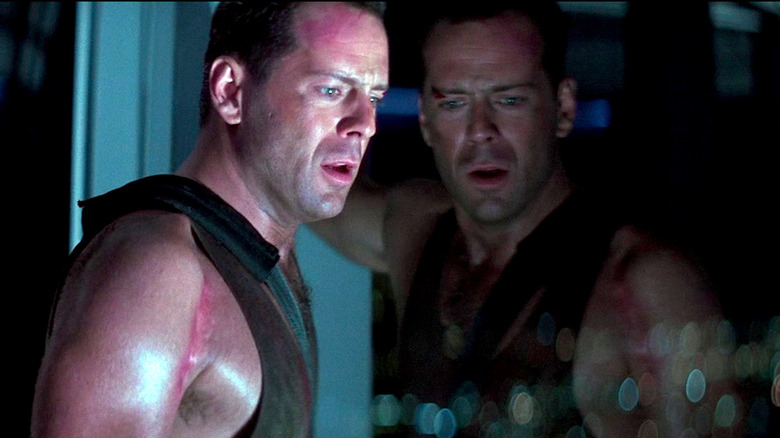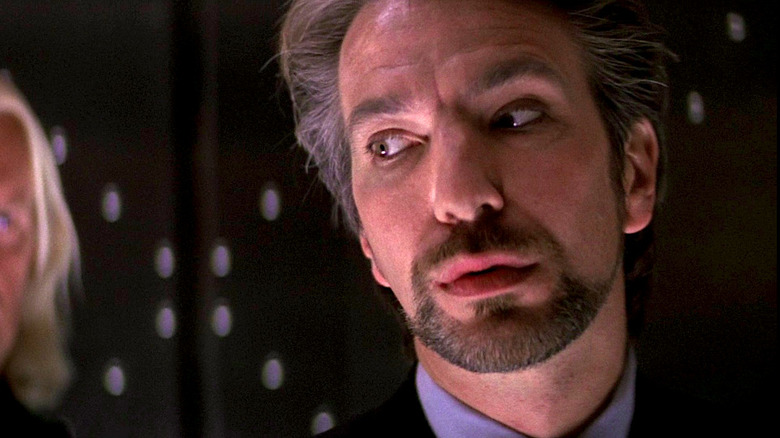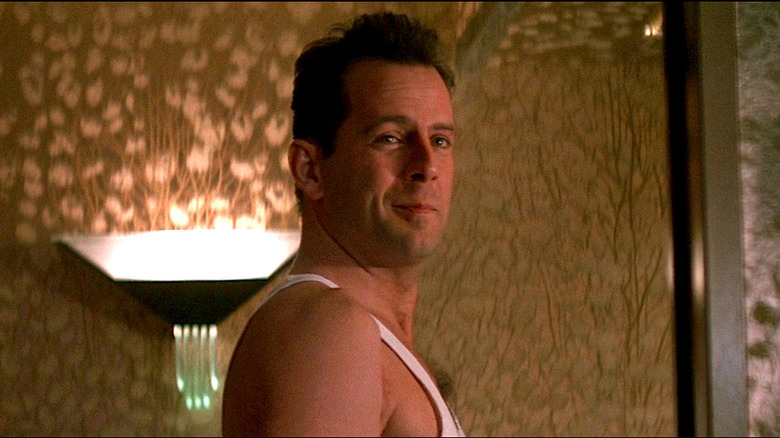If You Ask The Writer, Bruce Willis Was Never Die Hard's Protagonist
In a typical action movie, there is always a hero and a villain. Usually, the hero doesn't know they're the hero until they find themselves inexplicably face to face with the villain and the villain's evil plan. But once the hero realizes they alone must work to stop the villain from, say, world domination, they step up to the plate and get ready to take the villain on. If you're thinking of this in slightly fancier terms, what I'm talking about is the relationship between the protagonist of a story and their antagonist.
John McTiernan's "Die Hard" is a fantastic example of the protagonist/antagonist relationship. In the film, Bruce Willis plays Detective John McClane. Hoping to win back his wife's affections during her company Christmas party, McClane finds himself in quite the pickle when the building and everyone inside it is unexpectedly taken hostage by the deliciously menacing Hans Gruber (Alan Rickman), a German crook posing as a terrorist hoping to steal a large sum of money in the form of bonds from the Nakatomi Corporation's vaults. Gruber's only problem is that McClane manages to avoid being captured and is now loose in the building and looking for a way to save his wife. What follows is nothing but pure, action-packed bliss as we watch McClane and Gruber face off in all sorts of crazy and creative ways.
It would seem obvious to anyone watching the movie that McClane is our true hero, our protagonist, and Gruber is nothing but a sleek villain designed to throw a wrench into McClane's plans to woo back his estranged wife. However, if you talk to Steven E. de Souza, one of the writers behind the "Die Hard" script, you'll find that his view of the true protagonist of "Die Hard" is not who you would expect at all.
What makes a true action movie protagonist
Screenwriter Steven E. de Souza is known for his action movie screenplays. With films like "Commando," "Judge Dredd," and, of course, "Die Hard," de Souza is kind of an expert on how to write an action movie. In an interview with Creative Screenwriting, he gives some advice on the matter, which includes some fairly interesting hot takes ... including that he believes there is no such thing as an action movie, and that the real protagonist of "Die Hard" is not John McClane, but Hans Gruber, the film's main villain.
His reasoning for this re-labelling of the movie's main character? Simply put, Gruber is the one who makes everything happen. "If you're doing genre, the protagonist is the villain," he explains, going on to say, "It's Hans Gruber who plans the robbery. If he had not planned the robbery and put it together, Bruce Willis would have just gone to the party and reconciled or not with his wife."
Based on his comments, de Souza's definition of the "protagonist" is one rooted in creating the catalyst for the conflict and action to occur. Therefore, according to this definition, it's possible to have a hero not be the central protagonist because the hero's only purpose is to react to the actions that the protagonist (i.e. the villain) sets in motion. It's an interesting take on character and one that will definitely stir up much debate, but I can't help but feel like de Souza's definition of what a true protagonist is and does falls a bit short.
Are you sure about that?
When we look at the etymology (yupp, I'm going there) of the word "protagonist," we find a word with Greek roots. Originally intended to mean the main character in a play, the protagonist is the person we follow through the story from start to finish. In other words, we are invested in them and their personal struggle. In the case of "Die Hard," this would undoubtedly be McClane. He is the character we are introduced to from the very start. We sympathize with him and his desire to win back his wife, and we worry about whether or not he will succeed in doing so as he battles Gruber and tries to stay alive.
While it is true that Gruber's actions are what make the plot of "Die Hard" interesting, I would argue that they exist second to McClane's main mission to patch up his relationship with his wife. In other words, Gruber's decision to hold the Nakatomi building hostage is really just the thing that gets in the way of McClane's main goal. By throwing a metaphorical wrench into McClane's plans, Gruber is operating much like the classic antagonist of a story as a person whose main purpose is to "contend with" or get in the way of the protagonist.
Perhaps what makes de Souza believe that Gruber is the true protagonist is the idea that the protagonist drives the plot forward by making decisions that affect or change the story. But while Gruber definitely does this with his whole "hostage" narrative, in order for him to be a true protagonist, we would have to see the story through his eyes and not McClane's. "Die Hard" is not set up to have us rooting for Gruber's success. His story and his goals are secondary to the film's main goal which is to see McClane reconciled with his wife.
Who knows? Maybe de Souza is right that Gruber is the protagonist, after all. But when you consider the film's actual story, it seems pretty obvious Gruber is the antagonist and nothing more.


